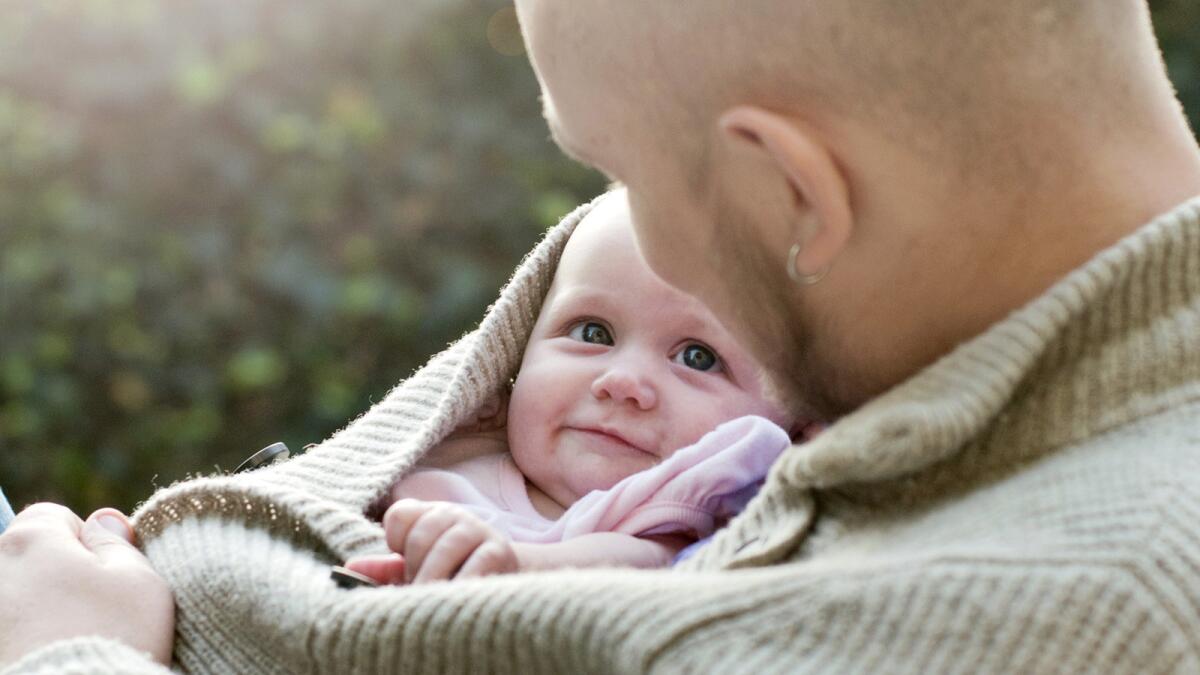Weighing fatherhood? Gaining a few pounds comes with the territory

That little bundle may add a little weight to a new dad, says a new study.
- Share via
A guy welcoming his first child into the world often expresses a deep desire to become a better man and vows to shape up so he can “be there” for years to come: He’ll drink less, stop carousing, get back to the gym.
Then comes parenthood — and with it, an average weight gain of roughly 3 to 5 pounds for a man who lives in the same home as his child.
As young men reach the age where many become first-time fathers, researchers have found that modest increases in body-mass index, or BMI, were a near-universal phenomenon. But after a first child arrives, the BMI trajectory of the average young dad living at home with his child stays on a steady upward course.
And these men tended to go into fatherhood with higher BMIs — 8% higher — than those of their childless peers.
In short, all that energy expended by changing diapers and comforting a fussy infant does not, for most new dads, work off the take-out meals and midnight snacks that often come with new parenthood. Over the roughly six years following the birth of their first child, live-in dads picked up an average of about .6 BMI units.
(For a 5-foot-10-inch man weighing 175 pounds, that is a weight gain of about 4 pounds. See a BMI calculator here.)
During the same period, the average BMI of men who have not fathered a child tended to decline slightly. The average BMI for men not living with their babies went up. But compared with resident dads and non-fathers, these men launched their fatherhood years with much lower BMIs, and their weight gain after the birth of a child nudged their BMIs up only slightly.
The study used data collected on 10,623 young men over a 20-year period as part of the National Longitudinal Study of Adolescent Health. Many of those tracked were enrolled when they were 12, and some were followed to the age of 34. The new research was published Tuesday in the American Journal of Men’s Health and led by researchers at Northwestern University’s Feinberg School of Medicine.
The experience of new live-in dads appears to parallel that of first-time moms: Studies that have followed women after childbirth for anywhere from four to 10 years show that they tend to gain roughly 1 to 3 pounds more than do women who have not given birth. But for women who go on to bear more children, or who went into a first pregnancy overweight or obese, postnatal weight gain can average from 3 to 13 pounds more than that seen in women who did not bear children.
Why do dads’ weight matter? Remarkably, research finds that an overweight or obese father has an outsized influence on his children’s weight. In families where the father is overweight and the mother’s weight is in the normal range (a BMI of 25 or less), one study found that children tracked over four years were more than four times likelier to be obese than in a family where both parents have a BMI of 25 or less. If the father is obese, the odds of his children becoming so was nearly 15 times higher.
In the same 2012 study, a mother’s weight wasn’t nearly as powerful an influence on her children. In families where dad was normal weight and mom was overweight or obese, kids were not significantly more likely to be obese.
That makes new fathers a key ally in any campaign to prevent child obesity, which now affects 1 in 6 American kids between the ages of 6 and 19. In Australia, an initiative called Healthy Dads, Healthy Kids has acted on the pivotal role of fathers: A 2014 study found that participation in the program boosted physical activity and improved nutrition in children as it aided weight loss and improved their dads’ health across a range of measures.
Dr. Craig F. Garfield, a Northwestern University pediatrician and lead author of the new article, has found that new fathers experience an increase in depression symptoms in the early years after their child’s birth. But many such men are wary of seeking regular medical care because they believe they’re too young to have health issues worth addressing.
For their sake, and their child’s well-being, pediatricians should seize the opportunity of this “magical moment” in a young man’s life to change that belief, Garfield said.
“New dads are coming into the healthcare system as a pediatric chaperone,” Garfield said. “This is an opportunity to talk about things that are important for dad’s health and the child’s health and to offer dads nutritional counseling and mental health education.”
Follow me on Twitter @LATMelissaHealy and “like” Los Angeles Times Science & Health on Facebook.







